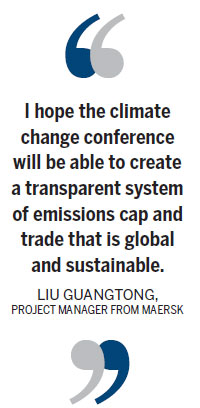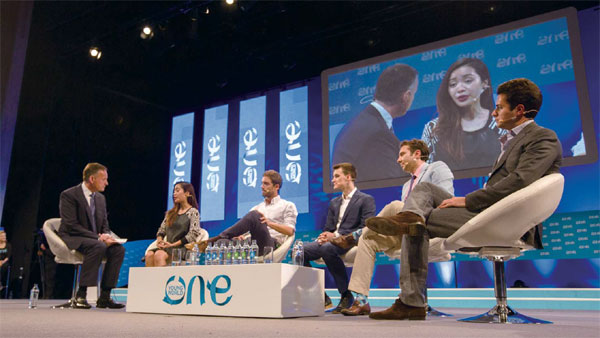The young are doing their bit, too
Updated: 2015-11-20 08:09
By Cecily Liu(China Daily Europe)
|
|||||||||||
Youth put heads together in world conference where climate change is a key issue
For Senlin Deng, manager of a L'Oreal cosmetics factory in Suzhou, Jiangsu province, protecting the environment and minimizing emissions relating to his plant is just as important as profitability.
"Living in China and witnessing the amount of pollution and extreme weather changes, I feel that the environment is so important," the 29-year-old says.
|
A discussion during the One Young World 2014 Forum in Dublin. Chinese speakers for this year's forum say young people in the country care a lot about environmental protection and that many are keen to take steps to help in their own way. Provided to China Daily |
"Working in my job I realize that factories have a very big impact on the environment, so I try to do my best to introduce environmentally friendly methods to manage my factory."
In eight years working for L'Oreal, Deng has gained experience in China and elsewhere. Frequent opportunities to visit other factories have allowed him to think about how to improve practices in China, he says.
He has worked at several factories, and has pushed all of them to the top standard for environmentally friendly construction.
"To build a more environmentally friendly factory entails a lot more investment financially and in human resources during the construction period. Often companies don't invest in such initiatives, but we decided to meet higher standards because efficiency will bring financial benefits later on."
Deng was due to be one of the young leaders at this year's One Young World conference in Bangkok between Nov 18 and 21. Hailed as the youth version of the Davos World Economic Forum, the conference brings together people under the age of 30 who have demonstrated leadership qualities in their fields to discuss ideas, of which climate change is a key topic this year.
"I really look forward to sharing some of my practices in implementing environmentally friendly initiatives at work with people of my age, and then listen to their ideas, which I'm sure will be very inspiring," Deng says.
Today's young people in China are ever more attuned to the importance of environmental protection, and many are keen to take steps to help in their own ways, he says.
The difficulty is often finding out the best method to contribute, and Deng says this is a process he has explored for many years.

"At first I was confused, but after observing much of how my colleagues in other countries are taking concrete steps to reduce climate change at work, I believed I could do the same."
After observing best practices abroad, Deng has taken the initiative to document the PM10 and PM2.5 levels of every emitting channel of his factories, because from experience he realized a lot of the chemicals used in manufacturing beauty products are absorbed by the air, so to monitor these emissions is a key way to create reduction targets.
Another project he is planning to collect data relating to the water consumption of L'Oreal products by taking into account consumption in the supply chain.
"By collecting these data we can encourage our raw material suppliers to act in a more responsible way, so the overall environmental benefit is increased."
Like Deng, Liu Guangtong, 30, a project manager for the Danish logistics company Maersk, is a young professional implementing environmentally friendly practices in his workplace.
As a procurement project manager, Liu says he always thinks about the impact on the environment of the products and raw material that he buys.
"At Maersk I learned to question the emissions impact of my suppliers' products, and often I would explain to them the environmental consequences of different products. By making them understand that we prefer the more environmentally friendly version, even at higher costs, they supply these to us."
In addition, Liu's team is involved in projects in conjunction with suppliers to develop more environmentally friendly technology. One example is to develop electric vehicles to be used at ports that would replace petrol and diesel vehicles with the same functions. These have already been developed, and many ports in China have ordered them.
Today's Top News
Xi to attend Paris climate conference
Putin: Turkey's downing of jet 'stab in the back'
Russian senior military official confirms death of one Su-24 pilot
Nations to boost infrastructure ties
Turkey downs Russian fighter jet near Syria border
Premier: China ready to advance Baltic Sea high-speed rail project
Fiscal subsidies and contributions can bridge pension fund deficit
Timeline set for 16-country trade pact
Hot Topics
Lunar probe , China growth forecasts, Emission rules get tougher, China seen through 'colored lens', International board,
Editor's Picks

|

|

|

|

|

|







